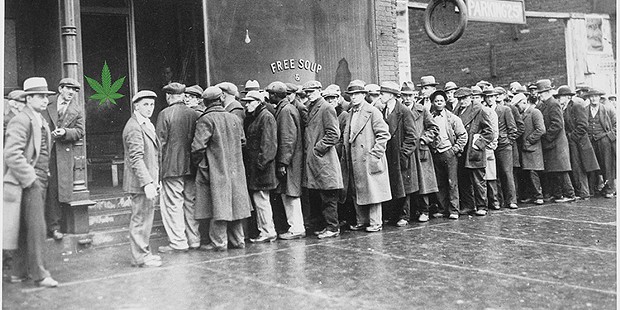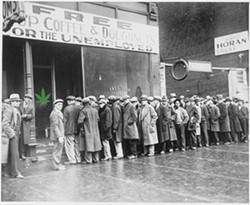
[
{
"name": "Top Stories Video Pair",
"insertPoint": "7",
"component": "17087298",
"parentWrapperClass": "fdn-ads-inline-content-block",
"requiredCountToDisplay": "1"
}
]
A little more than five weeks have passed since recreational marijuana became legal in California and local dispensaries remain bustling.
"We've been a lot busier than we expected," says Ray Markland, company manager for Eureka's EcoCann dispensary. "We expected a 20 to 30 percent bump in business but it's been 200 to 300 percent."
Mariellen Jurkovich, owner of the Humboldt Patient Resource Center in Arcata, agrees things have been "super busy" since the dispensary opened recreational sales last month. And that's brought a variety of changes.
"It's been a different atmosphere," Jurkovich says, adding that lines have swollen with first-time customers who bring a litany of questions about various products, from flowers to edibles to concentrates.
Markland says he's already seen a fair number of repeat customers, intoning that there's more to this legal green rush than novelty alone. While the transition to legal recreational cannabis sales is exciting, it hasn't been a boon for everyone.
"I think medical patients feel somewhat left behind," Markland says.
Medical marijuana patients, who have enjoyed a fairly stable marketplace for more than a decade, have indeed seen their medical supply chain upended overnight as the state put medical and recreational cannabis under a single regulatory umbrella. For medical patients, that means they're now waiting in longer lines to buy more expensive products that they now also have to pay taxes on.
While the regulations do allow patients with a state-issued medical identification card to avoid some taxes, Markland says most patients don't want to go to the Department of Health and Human Services to have their name put in a statewide database. (The cards cost $100 and, Jurkovich says, MediCal patients get a $50 discount.) Most patients, Markland says, have even bristled at new regulations requiring customers to offer up their identification so dispensaries can make sure they don't purchase more than the single ounce a day that the law allows.
In addition to the taxes — which run almost 25 percent locally and as high as 40 percent in other parts of the state — prices are going up with the added regulations.
Consider the production of a hash oil. Markland says manufacturers, which must now go through the expensive process of getting licensed and permitted, now have to source their trim and buds from licensed and permitted growers. The trim and bud must then be tested at a licensed lab before it's used to make the oil, which then needs to be tested again before being brought to market by a licensed distributor. Each step adds costs that trickle down to recreational customers and patients alike.
And while some dispensaries and nonprofits used to run programs for the catastrophically ill and indigent that gave them cannabis products at little or no cost, that's now generally considered verboten under the new state guidelines, which require dispensaries to pay taxes on any products that move through their doors. But as with many regulations, it appears this is open to some interpretation.
"The more you read the guidelines, they're like the Bible — every religion reads them a little bit differently," says Jurkovich, adding that she believes dispensaries are still allowed to give "free samples" to medical patients with a state identification card.
As to broader concerns about whether there would be enough licensed supply to meet demand, Jurkovich and Markland say so far, so good.
Markland says there have been some hiccups as far as getting specific products — pointing out that some locally produced offerings are now being distributed through San Francisco or Santa Rosa, which causes some hangups. He also adds that EcoCann stocked up heavily on cannabis flowers prior to the rules taking effect Jan. 1, meaning it hasn't yet had to source its 24 strains of flowers through the newly regulated supply chains. Both he and Jurkovich say they've worked to develop relationships with local growers and distributors who have helped keep them at the front of the line.
Currently, Markland says all but a few of the EcoCann's products are grown and produced in Humboldt County but he wants to be able to boast having 100 percent local products in the near future to showcase and celebrate cannabis country's best.
"This is our shot," he says.
Thadeus Greenson is the Journal's news editor. Reach him at 442-1400, extension 321, or [email protected]. Follow him on Twitter @thadeusgreenson.
Comments
Showing 1-1 of 1
more from the author
-
Deputy Shoots Cutten Shooting Suspect
- Apr 25, 2024
-
Officials Weigh in on SCOTUS Case's Local Implications
- Apr 25, 2024
-
Arcata Lowers Earth Flag as Initiative Proponents Promise Appeal
- Apr 25, 2024
- More »
































